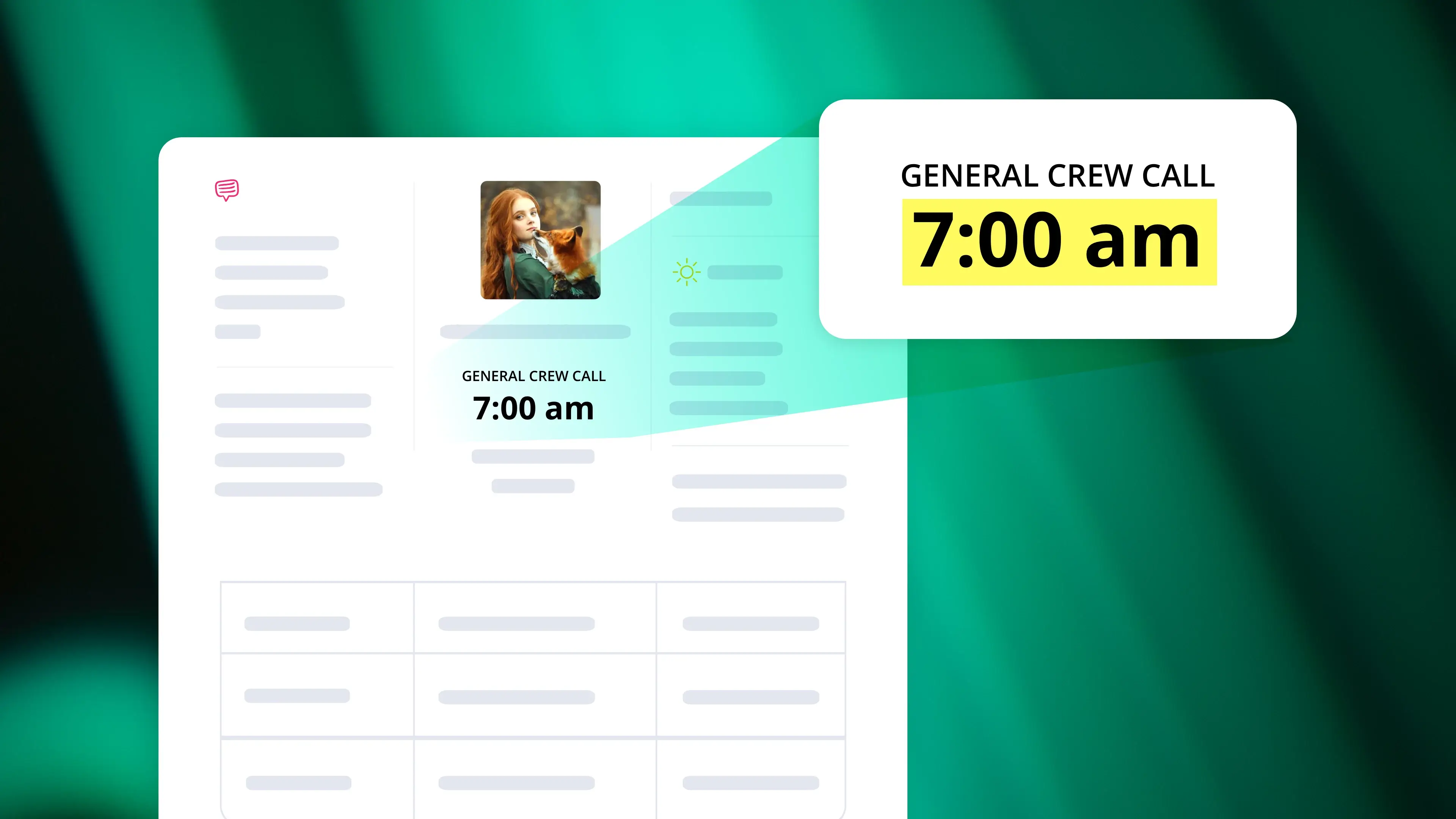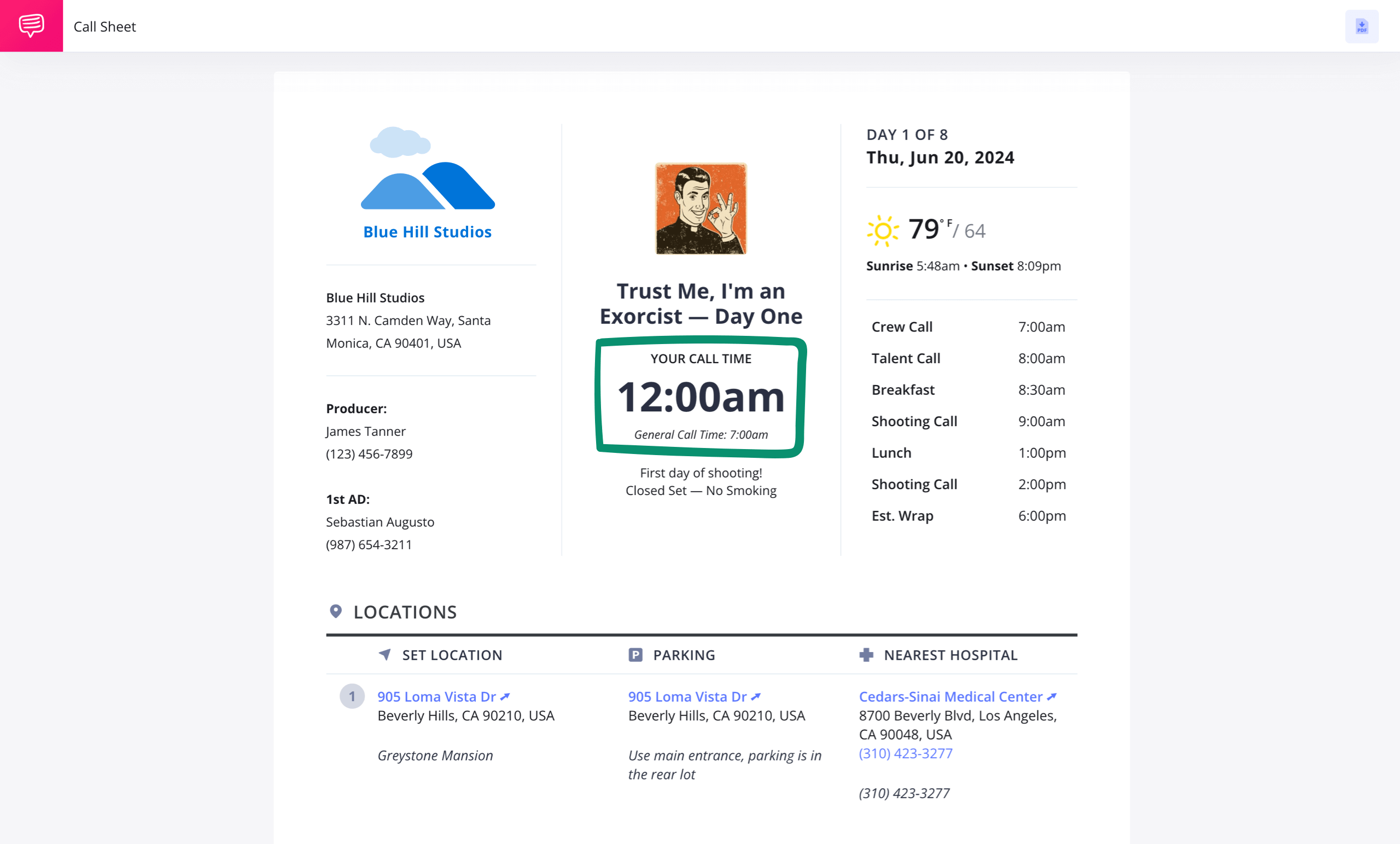Whether you’re a producer, a coordinator, an actor, or a parent of an actor, you’re probably well-versed in the industry-term, ‘call time.’ But if you’re coming to this post being none of these people, or soon to be one of these people, and you have no idea what it is, you can breathe easy. This post answers what is call time, and lets you know where to find it.
Call Time Meaning
First, let's define call time
Film terminology can get confusing, especially on set. But the call time is fairly self-explanatory, and yet, one of the most critical things to remember if you want to keep your job. One thing that will get you fired is being late, which is why understanding your call time is so critical.
Call Time Definition
What is call time?
A call time is the time the cast and crew of a production needs to be on the set, ready to work. The crew usually has an earlier call time than the actors because they need to get everything ready for shooting. The purpose of the call time is to stay on schedule, so the production can stay on budget.
Call times are set way ahead of time, usually by the first assistant director or production coordinator. This information comes from the producers and director. Department heads have calculated how long each shot will take to setup and shoot, determining a call time for each day and each department.
Where is the Call Time?
Look at your call sheet
Call sheets are usually sent to you the night before. It’s a document that lists literally everything you need to know about the shoot day. Always check your email before you go to sleep to know exactly where and when you need to be on set. These documents are often emailed, but StudioBinder's call sheet software allows you to send text notifications as well.
Click the call sheet example below and you'll see how these times are shared.
What is Call Time? • Click to view the call sheet
Notice how it is setup. Follow the row with your name to your call time and notice where you need to be at that time. You may have a different location than someone else.
PRO TIP
You should not be pulling into the parking lot at your call time, you should be a few minutes early, reporting to where you need to be at the stated time. If you’re late enough times, producers will have no problem replacing you!
The call sheet also notifies if there are any company moves for that day. If you’re the person making the call sheets (usually the 2nd Assistant Director), all of this information can be easily inputted in StudioBinder’s call sheet template.
For more, check out How to Make a Call Sheet.
RELATED POSTS
Who Arrives First on Set?
Take pre-calls into account
Contrary to what a quick look at a call sheet may lead you to believe, there is rarely just one call time that everyone abides by. Different crew members and cast will often have different call times.
Call times that occur before the general crew call are called pre-calls. Pre-calls are for roles whose work needs to be underway by the time the rest of the cast and crew arrive. A few positions which typically have pre-calls:
Craft Services
If you’re shooting in the morning, your crew will usually be expecting to see food and coffee when they show up. So crafty needs to be there a bit earlier, setting up so that they’re ready for a hungry team.
Locations
The locations manager is in charge of, you guessed it, location, they’ll typically get there a bit earlier to make sure the space is open and ready for business.
Production
The production department, which includes the assistant directors and production assistants, will often get to set early to prepare to be able to instruct the rest of the film crew on where to go.
Art Department
If a set still needs to be decorated, the art department will likely be called early so that the set will be ready to go for lighting and shooting.
If you are in any of these departments, you should read the call sheet closely — there’s a good chance you may be subject to a pre-call. Even if you’re not in these aforementioned departments, it’s always a good idea to double check that the general call is in fact your call time.
Related Posts
What is Call Time for Cast vs Crew?
Determining call time
Pre-calls aren’t the only consideration you’ll need to take into account. Often, the crew and the cast will have different call times. This is because both parties have very different prep work to do. If a crew has a complicated lighting set up that will take a while to prepare, they may be called earlier than an actor so that the actor isn’t sitting around waiting.
Conversely, if an actor needs to get into very involved prosthetics before the shoot, they may have to show up for hair and makeup hours before filming commences, while that may not be necessary for the rest of the crew.
PRO TIP
Hair and makeup should always show up some time before an actor’s call time. This is because these departments will be the first to work with the talent, so they’ll want to be ready to go as soon as the actor arrives.
The goal with call times is to have everyone ready at about the same time. You want to avoid a crew sitting around waiting for an actor, and vice versa.
Related Posts
Up Next
Call Sheets Explained
If you’re frequently late, you may not hit it off with the producers or director. In fact, they could potentially replace you, if you actively choose to disrespect them and the rest of the cast and crew. It’s really important you know what kind of information is given to you ahead of your call time, so you can look it over, and not waste time once you get to set. Learn the fundamentals below.

